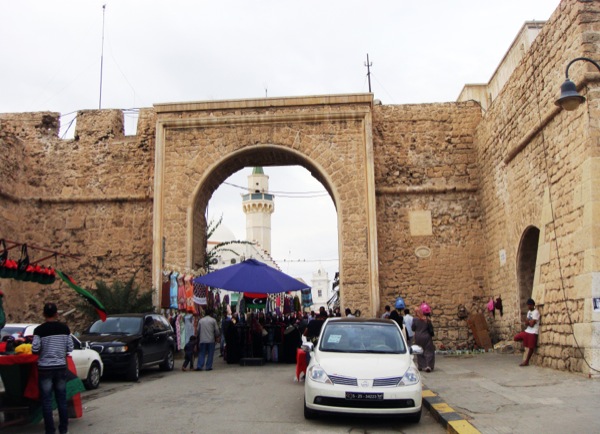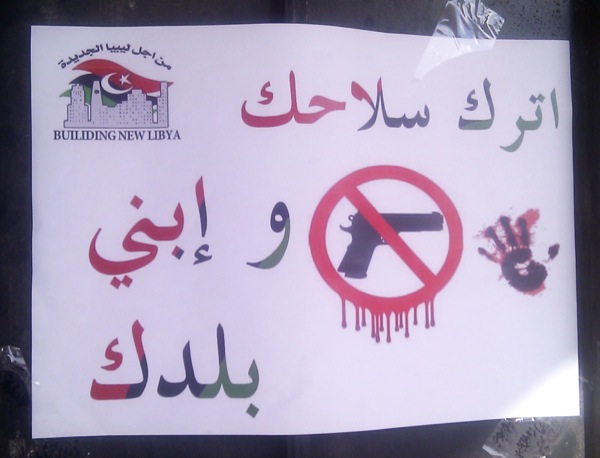Voting in Libya
Voting in their first election has profound effect on Libyan MEPI students
4:15 p.m., Sept. 19, 2012--On July 7, 2012, Libyans took part in their first parliamentary elections since the end of strongman Muammar Qaddafi’s rule in October 2011. It was the first time in 60 years that Libyans voted, resulting in the peaceful election of Prime Minister Abdurrahim Abdulhafiz El-Keib.
Three Libyan students in the State Department-sponsored Middle East Partnership Initiative (MEPI) at the University of Delaware had the opportunity to vote in the election. A student mentor drove them to Arlington, Va., where they voted in absentia.
Global Stories
Fulbright awards
Peace Corps plans
“They came back with the ink on their fingers, quite proud,” said James Magee, professor of political science and international relations at UD, who conducted seminars on American politics for the MEPI students. “To me this is a sign of a promising future for the whole region -- that young people are willing to vote and lose and say that I lost -- that is moving in the right direction in the political legitimacy of a new Libya.”
The experience had a profound effect on Ahmed, a 2010 MEPI student from Tripoli.
“It was a new experience to elect the people that you want and put them in positions of power, to lead your country,” said Ahmed, whose past included spending 70 days in a Libyan prison, where he was tortured. “Everyone on that day was happy and smiling; it was like the Eid [religious celebration] in Libya. When someone asked about my opinion and he agreed with it, I felt like a real human whose opinion counted.”
Ahmed talks with enthusiasm about his classes at UD with Magee and Audrey Helfman, associate professor in the School of Public Policy and Administration. Influenced by Helfman’s leadership class, he decided to begin a project to get his fellow Libyans to give up their guns and hand them over to the government.
Now in his last semester in mechanical engineering, Ahmed recently started his own company and regularly volunteers in community service projects, including a program focusing on challenges facing women.
“I have one goal in this life — that is to fix the world starting with my own country. Someday, I hope to make this dream come true by being in position of power.”
It was the first time that Younes, a MEPI 2012 student from the city of Benghazi, voted.
“It really meant a lot to me to participate as at that point only did I become sure that all the people that died during the revolution didn't die in vain and that Libyans were able to build on their sacrifices towards building a better future for Libya.”
Most of the courses enriched his knowledge in many areas, especially the leadership class. “It showed me how to enhance the skills I have and to search and find the ones I don’t have, put them into practice. I believe that I and the rest of the Libyans need to always act with a positive attitude. The most important thing,” he says, “is to be patient because rebuilding a nation takes time and commitment.”
“I would like to see a Libya were Libyans are treated equally; I want Libya to be a major and positive player in the Middle Eastern region. One day,” he says, “I would like to see Libyans have the highest standard of living.”
Mohamed, a MEPI 2012 participant, is from Misrata but lives in Tripoli. In better understanding through MEPI the history of the United States and its wars, he said he “became certain that Libya will one day be one of the most civilized nations in the world.”
Mohamed, who studies architecture and urban planning, said he was “elated” to have been able to vote. “Voting meant a lot for me. We have suffered a lot to finally reach the right to choose, the right to self-governance. The election of the national council was a very special day for me.”
He says his goal is to contribute in making the world a better place.
“I want to be a leader in the development of Libya and make it into a democratic and civilized state by achieving the highest scientific and professional echelons in the field of architecture and planning.”
Libyan MEPI students cast their votes
During the recent elections, Libyan students from across the country who participated in the MEPI program -- 14 of 118 were from Libya – joined those from UD and gathered at the out-of-country voting center in Arlington to vote for the first time in their lives.
The MEPI Student Leaders Exchange Program brings undergraduate students from the Middle East and North Africa (MENA) to six universities across the U.S. to develop their leadership skills, their understanding of the American system of government and civil society and to explore ways to enhance democratic participation in their home countries.
Joann Kingsley, a UD alumna who was a teaching assistant for Magee in the 1990s, worked closely with people on the ground between October 2011and June 2012. She was the country director for Libya and Tunisia for the Danish Refugee Council.
On Election Day, she said, “One of the young men who worked for me wrote via Skype and told me he was so proud and excited to vote, that he was overcome with emotion at the polling station and openly wept with joy. This is the kind of story that makes me hopeful for Libya.”
Note: Ahmed posted the following on Facebook the day after the tragic events in Benghazi and the death of Ambassador Christopher Stevens and three employees at the U.S. Consulate:
Attention Libyans: Protests to be held today in Libya against yesterday’s attacks & outcomes. 5:00pm #Tripoli: Algeria SQ and #Benghazi: Shajara SQ. We ask that everyone wears either white or blue to express our demand for the rule of law and security. Let us properly represent the teachings of Islam. Please tag all those in Libya, so that they condemn the act of violence, and loss of an innocent life.
Article by Fariba Amini
Photos by Joann Kingsley












